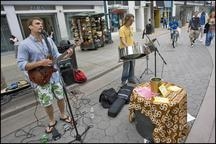
CITY HALL — City Hall officials like to promote the Third Street Promenade as a one-of-a-kind experience — a pedestrian area for shopping and dining that’s also a vibrant public space.
Where else in Southern California, after all, can you buy a shirt at Banana Republic, watch a street performer catch a tea pot with his head and listen to a creationist debate evolutionary theory with passers by all in the space of a few city blocks?
But there’s one aspect of the promenade officials could do without: the noise.
Thanks largely to amplified musicians and performance groups that use PA systems to round up crowds, officials with the Bayside District Corp., the public/private organization that manages Downtown, say the volume, especially on busy weekend nights, has become too much for some visitors and business owners.
“The noise levels are completely assaulting … it’s just simply too loud,” Kathleen Rawson, Bayside’s CEO, told the City Council this week during a regular review of the ordinance governing street performers. “One thing that we know for sure is that the noise level has to be reduced.”
Even through tripple-paned, second story office building windows, Rawson said the din from promenade performers is often audible.
Making new rules to quiet them down, though, could be a touchy issue. Because the promenade is a public street, not a private mall, officials are bound by broad First Amendment free speech protections that preempt regulations that could be interpreted as an impediment to free expression.
Making matters even trickier is a recent court ruling that struck down as unconstitutional the regulatory system for the Venice boardwalk that the city of Los Angeles put in place in 2008 that required performers and vendors to acquire permits via a lottery system in order to occupy spaces on the beachfront strip.
The court also invalidated an L.A. City Council rule that had banned the use of musical instruments and amplifiers in designated areas.
That means banning amplifiers on the promenade is off the table, Santa Monica City Attorney Marsha Moutrie said this week.
But there could still be ways to reign-in the noise level. The maximum permitted decibel level on the promenade varies depending on the time of day but tops out at 107 dbl, and Moutrie said it’s a possibility the council could choose to lower that threshold.
But to musicians who earn their living playing on the promenade, that move would come as unwelcome news.
Justine Bennett, a guitarist and singer who’s a regular, said she tracks her volume level with a decibel measuring iPhone app. While she strives to stay below the limit, she said there’s a financial incentive to turn it up.
“The louder you are, the more money you make,” Bennett said.
While she’s never received a ticket for violating the noise ordinance, she said police officers regularly monitor the musicians’ noise levels and frequently warn performers to keep it down.
“They’re always walking around and they take it very seriously,” she said.
On Tuesday, the City Council gave no specific directions about a tougher noise ordinance for street performers but members indicated they were concerned about excessive volume.
“I think all of us want to strongly protect free speech and have this as free a forum as humanly possible,” Councilman Richard Bloom said. “[But] in some respects I think we’ve got a problem.”
The City Attorney’s Office is expected to bring options for further limiting the noise level back to the council at a future meeting.
Moutrie said her office will also suggest an addition to the street performers’ code that would bar convicted sex offenders from engaging in types of performance that entice children, a law that other jurisdictions have already passed. The council may also consider a rule aimed at ensuring that performers who use elaborate props in their acts are able to quickly pack up and evacuate in case of an emergency.
nickt@www.smdp.com








